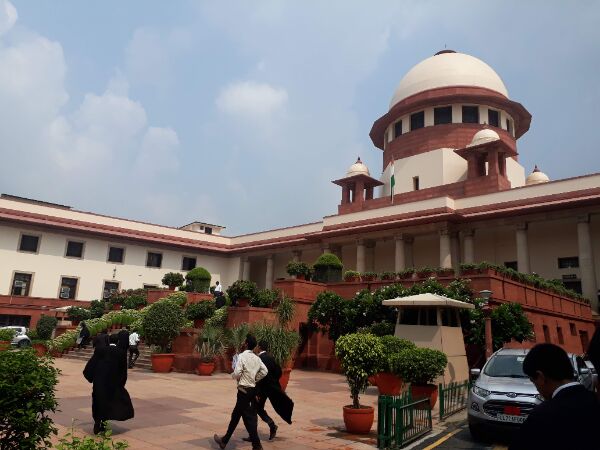Disproportionate bearing
Virtual hearings in courts stow away the ordinary lawyers while top lawyers are making the moolah

The legal profession, amongst the noblest professions, providing relief to thousands of litigants; and those lawyers who do not have steel spine or deep pockets filled with money, went topsy-turvy from the evening of March 24 last year when Prime Minister announced a 21-day nationwide lockdown for containing the pandemic.
The Supreme Court had announced of virtual hearings and that too with the listing of only urgent matters, to be decided by the registry office of the Court. Until today, the apex court is functioning virtually, affecting the budding, young and ordinary lawyers who survive on a day-to-day basis. Not only at SC, but a number of lawyers at different high courts and the lower courts are also struggling to survive; normally, the lawyers at lower courts function on a case-to-case basis to earn their daily bread.
The disparate mix has been intensified during the lockdown. Disproportionate income is a well-established fact in a lawyer's profession. The senior counsels across the SC, high courts and district courts charge enormous legal fee per hearing of the case. Their fees run into crores whereas the ordinary lawyers, barring a few, get a meagre amount, and that too has been reduced since the virtual courts have come in vogue.
Senior counsels, their juniors or lawyers with the practice of generations have raked in moolah as courts went online. Senior counsels, sitting in their super-tech offices at uber addresses either in the country at exotic destinations or overseas with dedicated internet connection, can argue several cases, including at the Supreme Court and maybe at some high courts in a duration of around three hours. On the contrary, before the lockdown, they were able to argue either at the SC or at one of the high courts in physical hearing.
Shivom Tyagi, a young advocate, says: "The top-notch senior lawyers on the 'miscellaneous day'— arguing in the SC and simultaneously at few high courts — may be earning around Rs 75 lakhs per day. Normally, senior counsels, when hired by juniors or any law firm, usually charge around Rs 15 lakhs per hearing per case. The virtual hearing has been a boon for senior counsels and bane for most of the ordinary lawyers."
Legal practitioners and sections of civil society are of the view of bringing the judicial services under the 'essential services'. Justice Lokpal Singh, retired from Nainital High Court, proffers: "The Article 19 of the Constitution of India, speaks about the 'speedy justice', meaning thereby that 'judicial services' come under the purview of essential services".
"Physical hearing in courts is a must; however, virtual courts are not bad. Until February 2021, I conducted physical hearings even during the pandemic with proper precautions, and not even a single Covid case was reported. Judges should come out of the mentality that they are the only ones who are vulnerable. The bureaucrats, policemen, army personnel, lawmakers, healthcare workers et al are working for the welfare of the citizens. Similarly, courts too shall work physically," adds Singh.
Advocate-on-record at Supreme Court, Sushil Balwada informs: "Two decades ago, the Harvard Law School of the USA did a research on Indian judicial system and found that in India only limited advocates are running the judicial system. The courts' system should be modified during the pandemic. The presence of the lawyers in court premises is a must, and lawyers while sitting in Mumbai, Goa etc. and not meeting clients in person need immediate attention. The legal profession is inexplicably affected by the discontinuation of physical hearings in the courts. As per Article 14 of the Constitution, it is in violation of a fundamental right allowing equal opportunity."
Akhil Prasad, double doctorate, PhD and LLD (Doctor of Laws), opines: "Video conferencing of cases in courts has acted detrimentally to the interests of a wide section of practising legal fraternity. Both the Central and state governments have brought many services under 'essential services', then why not bring the 'judicial services' too under the 'essential services'. Many services are functioning during the pandemic, even the offices of the Government of India are functioning all over the country, then why not courts? With due diligence in place, the courts can function, at the same time reducing the number of pending cases."
The Supreme Court Bar Association and other High Court Bar Associations devised financial help strategies for stressed lawyers. Some 2,000 women lawyers have also written a letter to Amit Shah for improving the virtual hearing system in courts across the country. Also, in the recent past, some 500 lawyers wrote to the Chief Justice of India highlighting the plight of ordinary lawyers and demanding the start the functioning of the physical courts. Rakesh Sherawat, co-chairman of Bar Council of Delhi (BCD), informs: "BCD is extensively working for lawyer's welfare and has already provided assistance worth Rs three crores to lawyers. Also, it is intensively taking up the matter for getting physical hearing started in the courts."
It is not necessary that every advocate is computer proficient and technology savvy, even there is a persistent problem of wi-fi connectivity in remote areas. Prasad further says: "As a section of lawyers who hail from hill districts or remote areas complain of poor wi-fi connection to attend virtual hearings from their native places. Many lack gadgets like laptops, desktops, printers or scanners. In the legal profession, the reality of economics is vicious."
The writer is an accredited freelance journalist. Views expressed are personal



